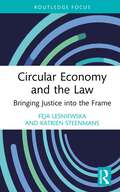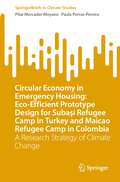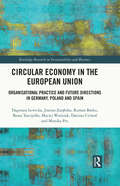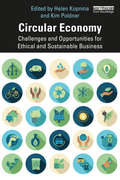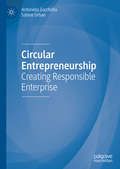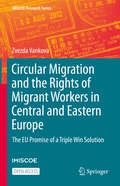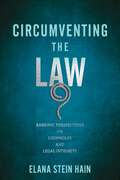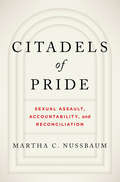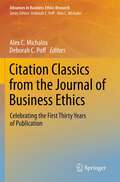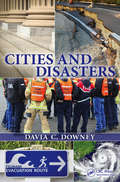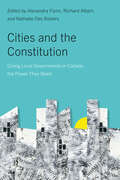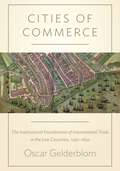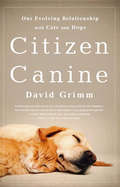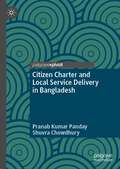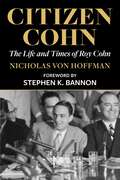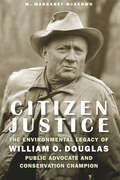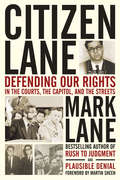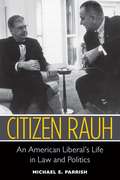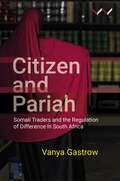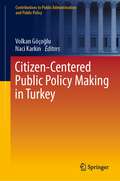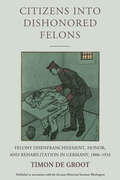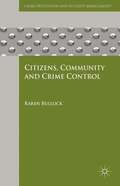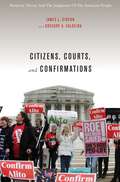- Table View
- List View
Circular Economy and the Law: Bringing Justice into the Frame (Routledge Focus on Environment and Sustainability)
by Feja Lesniewska Katrien SteenmansThis book explores the role of law and policy in circular economy transitions and their impacts on justice, including on distributional equity and recognition and procedural rights, especially for people already marginalised under the current dominant economic system. Amid increasing demand for virgin raw materials, and unsustainable consumption and waste disposal that are driving the global ecological and climate crisis, there are growing calls to urgently transition to circular economies. Despite an increasing number of circular approaches being adopted, implemented, and integrated in national and local laws and policies, the number of commercially successful business stories remains isolated. Moreover, questions about whether circular economy laws and policies are delivering fair and just global outcomes need to be addressed. This book examines this significant knowledge gap to understand legal experiences, including justice and equity issues in the global context, so that these can inform wider design and implementation. The book begins by explaining the concept of a circular economy and its context within wider issues of sustainable development and justice. The first part of the book then examines the legal context of the circular economy by analysing legal forms in practice and those recommended in wider scholarship before considering how these could impact on existing inequity and injustices globally. The second part delivers an empirical understanding of the implications of the law on circular economy approaches and the global equity and justice dimensions through two case studies on solid waste management and forestry. The final part addresses legal opportunities and challenges for wider implementation of circular economy approaches that incorporate justice into its framing. This book will be of great interest to students, scholars, and practitioners of environmental and natural resource law and policy, circular economy, industrial ecology, natural resource management, and sustainable development more broadly.
Circular Economy in Emergency Housing: A Research Strategy of Climate Change (SpringerBriefs in Climate Studies)
by Pilar Mercader-Moyano Paula Porras-PereiraIn recent years, there has been an upsurge in the number of forced displacements due to natural disasters, armed conflicts, and pandemics, which has favoured an increase in the number of temporary accommodations. Although the provision of shelter after an emergency situation is one of the priorities of humanitarian aid, the reality is that the conditions in which people live in a situation of forced displacement are absolutely precarious and overcrowded. Nowadays, this type of housing tends to have a short lifespan, deepening the environmental impact and the generation of waste. Likewise, added to this great problem is the linear economic system implemented worldwide, which also causes a high rate of waste.This investigation develops an eco-efficient design protocol that determines the basic premises in any emergency situation, therefore avoiding the precarious nature to which those in forced displacement are exposed. Moreover, the research investigates different constructive solutions that can respond to situations of natural catastrophes or humanitarian disasters where emergency housing is needed as well as the possible alternatives from the point of view of circular economy. Eco-efficient and environmentally correct solutions are sought, which can be adaptable to the different scenarios where emergency housing may be needed, thus creating a rapid, easy, functional, and environmentally correct architecture, adaptable to these types of situations. The study shows that the factors that characterize emergency architecture can be an example of where the issues around the sustainability factor are applied in a practical way. The main objectives of this study are to develop an eco-efficient design protocol which determines the basic premises in any emergency situation and to find eco-efficient and environmentally correct solutions, adaptable to different scenarios, which have similar climatic characteristics, and where emergency housing may be needed, thus creating a type of ephemeral architecture but sensitive to the user to whom it is intended and in accordance with the optimal conditions of habitability.
Circular Economy in the European Union: Organisational Practice and Future Directions in Germany, Poland and Spain (Routledge Research in Sustainability and Business)
by Dagmara Lewicka Joanna Zarębska Roman Batko Beata Tarczydło Maciej Wożniak Dariusz Cichoń Monika PecCircular Economy in the European Union: Organisational Practice and Future Directions in Germany, Poland and Spain presents the EU's journey towards a Circular Economy (CE), identifying significant organizational practices in this gradually adopted field among member countries. The book also aims to develop and propose innovative initiatives and practices for implementing CE across various economic sectors in selected EU countries, such as Poland, Spain and Germany. Covering topics which include the implementation of CE in the EU and worldwide, green employee behaviors, corporate social responsibility in creating pro-environmental attitudes and models of eco-digital factory transformation in SMEs, the book emphasizes the importance of innovative, environmentally friendly, low-waste, and low-emission technologies. Consisting of thirteen interconnected chapters, it discusses the challenges and opportunities of CE, the importance of business engagement in addressing social and environmental problems, and provides practical examples of innovative solutions in various sectors. This volume will be of great interest to students and scholars of circular economy, corporate governance, business ethics and sustainable business, as well as entrepreneurs, managers, government representatives, and non-governmental organizations active in CE.
Circular Economy: Challenges and Opportunities for Ethical and Sustainable Business
by Helen Kopnina; Kim PoldnerHow can we design circular business models? How can we organize the transition from a linear to a circular economy? And how can we imagine circular futures that help us transform current realities? This book aims to provide answers to these questions while addressing the challenges and opportunities of the circular economy. The authors reflect on why conventional sustainability models – such as the ‘triple P’ (People, Profit and Planet) or eco-efficiency – have failed in addressing environmental challenges, including climate change, biodiversity loss and pollution. They then move on to explore innovative circular business models, which propose to eliminate environmental damage by radically reforming the system of industrial production. Organizing the transition is a collaborative effort: entrepreneurs, consumers, policymakers, multinationals and intermediaries need to work together to foster the emergence of the circular economy as an institutional field. Together with younger generations of learners and equipped with beyond-human-centred values towards awareness of the material and natural world, novel circular futures can be imagined. Offering points of reference for continued critical discourse and examples of practically applicable sustainability solutions, this book will be of great interest to students, teachers, practitioners and scholars of circular economy.
Circular Entrepreneurship: Creating Responsible Enterprise
by Antonella Zucchella Sabine UrbanThis original book explores how the principles of circularity, considered a law of nature but neglected within the materialistic orientation of the industrial age, are becoming attractive again in business and society. Investigation reveals enterprises small and large delivering a stimulating message, from changes in entrepreneurial mindsets to the inclusive use of new technologies and a push for innovation. Zucchella and Urban explore the novel concept of circular enterprise, showing how, with their capacity to innovate, these firms are becoming the most powerful actors of a new, sustainable social order. They examine two fundamental questions: why is this revolution occurring now, and how is it being implemented? Focusing on the most innovative practices, they demonstrate the potential of circular enterprise for industry and wider society, making clear that a new world is emerging.
Circular Migration and the Rights of Migrant Workers in Central and Eastern Europe: The EU Promise of a Triple Win Solution (IMISCOE Research Series)
by Zvezda VankovaBy adopting a rights-based approach, this open access book sheds light on the different legal and policy instruments that have been adopted to implement circular migration policies in the EU and their consequences for the rights of migrant workers. It contributes to the understanding of the meaning of this concept in general, in the EU, as well as more specifically with regard to its Eastern neighbourhood. The book provides a comprehensive overview of the formation and implementation of the EU’s circular migration approach that has developed through both EU and national instruments on the basis of comparative case study analysis of Bulgaria and Poland’s migration law and policy. Furthermore, by applying legal empirical research methods, it draws conclusions about the policy outcomes from the implementation of the various migration instruments falling under the circular migration umbrella and shows the consequences for the rights of migrant workers as a result of the application of different policy options.Along with its value to an academic audience, the book can be used by policy makers at the EU, international and national level as well as international organisations and NGOs working in the field of migration law and policy.
Circumventing the Law: Rabbinic Perspectives on Loopholes and Legal Integrity (Jewish Culture and Contexts)
by Elana Stein HainCircumventing the Law probes the rabbinic logic behind the use of loopholes, the legal phenomenon of finding and using gaps within law to achieve otherwise illegal outcomes. The logic of ha’aramah, a subset of rabbinic legal circumventions mostly defined as a tool for private life, underpins both well-known circumventions, such as selling leaven before Passover, and lesser-known mechanisms, such as designating an animal intended for sacrifice “blemished” before birth to allow it to be slaughtered for food instead. Elana Stein Hain traces the development of these loopholes over time, revealing that rabbinic literature does not consistently accept or reject loopholes. Instead, rabbinic Judaism applies categories of evasion (prohibited), avoidance (permitted), and avoision (contested) to loopholes on a case-by-case basis. The intended outcome of a given loophole determines its classification, as does the legal integrity of the circumventive process in question.Yet these understandings of loopholes are not static—instead, rabbinic attitudes toward loopholing change over time. Early works display an objective, performative understanding of the self and of intention, but evolve over time to reflect more subjective and intimate understanding of the self and intention. This evolution redefines what legal integrity means in Jewish legal philosophy.Circumventing the Law brings readers through the Second Temple period to the modern era to see how loopholing has evolved over millennia. With a focus on late antiquity, Stein Hain explores tannaitic literature, the Palestinian Talmud, and contemporaneous Greco-Roman and Persian thought to show that when warranted, Jewish rhetoric and philosophy around understandings of loopholes was a unique phenomenon that relied on changes in understanding the definition of integrity itself, a key finding for scholars of Jewish Studies and of religious and of secular law writ large.
Citadels of Pride: Sexual Abuse, Accountability, And Reconciliation
by Martha C. NussbaumA groundbreaking exploration of sexual violence by one of our most celebrated experts in law and philosophy. In this essential philosophical and practical reckoning, Martha C. Nussbaum, renowned for her eloquence and clarity of moral vision, shows how sexual abuse and harassment derive from using people as things to one’s own benefit—like other forms of exploitation, they are rooted in the ugly emotion of pride. She exposes three “Citadels of Pride” and the men who hoard power at the apex of each. In the judiciary, the arts, and sports, Nussbaum analyzes how pride perpetuates systemic sexual abuse, narcissism, and toxic masculinity. The courage of many has brought about some reforms, but justice is still elusive—warped sometimes by money, power, or inertia; sometimes by a collective desire for revenge. By analyzing the effects of law and public policy on our ever-evolving definitions of sexual violence, Nussbaum clarifies how gaps in U.S. law allow this violence to proliferate; why criminal laws dealing with sexual assault and Title VII, the federal law that is the basis for sexual harassment doctrine, need to be complemented by an understanding of the distorted emotions that breed abuse; and why anger and vengeance rarely achieve lasting change. Citadels of Pride offers a damning indictment of the culture of male power that insulates high-profile abusers from accountability. Yet Nussbaum offers a hopeful way forward, envisioning a future in which, as survivors mobilize to tell their stories and institutions pursue fair and nuanced reform, we might fully recognize the equal dignity of all people.
Citation Classics from the Journal of Business Ethics: Celebrating the First Thirty Years of Publication (Advances in Business Ethics Research #2)
by Alex C. Michalos Deborah C PoffThe Journal of Business Ethics was founded by Alex C. Michalos and Deborah C. Poff and published its first issue in March 1982. It is the most frequently cited business ethics journal in the world. The Journal has always offered a multi-disciplinary and international public forum for the discussion of issues concerning the interaction of successful business and moral virtue. Its authors and readers are primarily scholars and students in social sciences and philosophy , with special interests in the interaction of these disciplines with business or corporate responsibility. Since the field of business ethics grew simultaneously with the growth of the Journal, a collection of its most cited articles is tantamount to a collection of the articles that had the greatest influence in defining the field over its first 30 years of development. In this anniversary volume, an overview of citation classics from the Journal is presented, the 33 most frequently cited articles are reproduced and brief reflections on the impact of the Journal on the field are given from over 100 scholars who authored citation classics and/or distinguished papers, as well as those who served on the Editorial Board and/or are recognized as leaders in the field.
Cities and Disasters
by Davia C. DowneyCities and Disasters presents interdisciplinary and multinational perspectives on emergency management policy, economic development, and the various factors that affect the recovery process after natural disasters strike urban areas. The book has three central themes: policy, urbanity, and the interplay of events after disasters that affect the pro
Cities and the Constitution: Giving Local Governments in Canada the Power They Need (McGill-Queen's Studies in Urban Governance #18)
by Alexandra Flynn, Richard Albert and Nathalie Des RosiersCanada’s largest cities have faced exponential growth, with the trajectory rising further still. Due to their high density, cities are the primary sites for opportunities in economic prosperity, green innovation, and cultural activity, and also for critical challenges in homelessness and extreme poverty, air pollution, Indigenous-municipal relationship-building, racial injustice, and transportation gridlock. While city governments are at the forefront of mitigating the challenges of urban life, they are given insufficient power to effectively attend to public needs.Cities and the Constitution confronts the misalignment between the importance of municipalities and their constitutional status. While our constitution is often considered a living document, Canada has one of the most complicated amending formulas in the world, making change very difficult. Cities are thus constitutionally vulnerable to unilateral provincial action and reliant on other levels of government for funding. Could municipal power be reimagined without disrupting the existing constitutional structure, or could the Constitution be reformed to designate cities a distinct tier of government? Among other novel proposals, this groundbreaking volume explores the idea of recognizing municipalities in provincial constitutions.The first volume of a complementary pair, authored by renowned Canadian legal and urban studies scholars, Cities and the Constitution suggests contemporary solutions to one of our most pressing policy dilemmas.
Cities of Commerce: The Institutional Foundations of International Trade in the Low Countries, 1250-1650 (The Princeton Economic History of the Western World #45)
by Oscar GelderblomCities of Commerce develops a model of institutional change in European commerce based on urban rivalry. Cities continuously competed with each other by adapting commercial, legal, and financial institutions to the evolving needs of merchants. Oscar Gelderblom traces the successive rise of Bruges, Antwerp, and Amsterdam to commercial primacy between 1250 and 1650, showing how dominant cities feared being displaced by challengers while lesser cities sought to keep up by cultivating policies favorable to trade. He argues that it was this competitive urban network that promoted open-access institutions in the Low Countries, and emphasizes the central role played by the urban power holders--the magistrates--in fostering these inclusive institutional arrangements. Gelderblom describes how the city fathers resisted the predatory or reckless actions of their territorial rulers, and how their nonrestrictive approach to commercial life succeeded in attracting merchants from all over Europe. Cities of Commerce intervenes in an important debate on the growth of trade in Europe before the Industrial Revolution. Challenging influential theories that attribute this commercial expansion to the political strength of merchants, this book demonstrates how urban rivalry fostered the creation of open-access institutions in international trade.
Citizen Canine: Our Evolving Relationship with Cats and Dogs
by David GrimmDogs are getting lawyers. Cats are getting kidney transplants. Could they one day be fellow citizens?Cats and dogs were once wild animals. Today, they are family members and surrogate children. A little over a century ago, pets didn't warrant the meager legal status of property. Now, they have more rights and protections than any other animal in the country. Some say they're even on the verge of becoming legal persons.How did we get here-and what happens next?In this fascinating exploration of the changing status of dogs and cats in society, pet lover and award-winning journalist David Grimm explores the rich and surprising history of our favorite companion animals. He treks the long and often torturous path from their wild origins to their dark days in the middle ages to their current standing as the most valued animals on Earth. As he travels across the country-riding along with Los Angeles detectives as they investigate animal cruelty cases, touring the devastation of New Orleans in search of the orphaned pets of Hurricane Katrina, and coming face-to-face with wolves and feral cats-Grimm reveals the changing social attitudes that have turned pets into family members, and the remarkable laws and court cases that have elevated them to quasi citizens.The journey to citizenship isn't a smooth one, however. As Grimm finds, there's plenty of opposition to the rising status of cats and dogs. From scientists and farmers worried that our affection for pets could spill over to livestock and lab rats to philosophers who say the only way to save society is to wipe cats and dogs from the face of the earth, the battle lines are being drawn. We are entering a new age of pets-one that is fundamentally transforming our relationship with these animals and reshaping the very fabric of society.For pet lovers or anyone interested in how we decide who gets to be a "person" in today's world, Citizen Canine is a must read. It is a pet book like no other.
Citizen Charter and Local Service Delivery in Bangladesh
by Pranab Kumar Panday Shuvra ChowdhuryThis book illuminates the importance of the citizen charter (CC) in local service delivery in Bangladesh. It describes how CC was implemented into the service delivery process and its impact. In the 1970s, the transition from traditional public administration to new public management was inspired by globalization, the emergence of an information and technological society, and many economic theories, such as public choice, principal-agent theory, and transaction cost. The purpose of the government in a welfare state is to serve the citizens by providing essential services. However, public service delivery in most developing nations is ineffective owing to corruption, waste of public funds, a lack of responsibility on the part of public employees, etc. In this context, CC emerged as a means of educating individuals on many elements of services, so they may hold service providers accountable. Thus, the issue of framing and implementation of CC has been put in place due to the persistent pressing of academicians, politicians, and practitioners advocating for better local service delivery.
Citizen Cohn: The Life and Times of Roy Cohn
by Nicholas von HoffmanNo one so famous or controversial led so many secret lives. Loathed by some, and well respected by others, Roy Cohn was known as the toughest and most brilliant lawyer in America. From his role in the Rosenberg trial and as chief counsel to Senator Joseph McCarthy through his extraordinary friendship with J. Edgar Hoover and his vendetta against Robert Kennedy, Cohn's reputation grew larger than life. Presidents, celebrities, gangsters, judges, and endless politicians crossed Cohn&’s path, either as friend or foe, including J. Edgar Hoover, Senator Joseph McCarthy, Julius and Ethel Rosenberg, Ronald Reagan, Robert Kennedy, Barbara Walters, Fat Tony Salerno, Louis Nizer, Si Newhouse, Rupert Murdoch, George Steinbrenner, Donald Trump, and many more. Cohn was the target of numerous indictments and haunted by professional misconduct charges which led to his disbarment shortly before his death. His private life, even more outrageous than his life known to the public, constantly had his name in gossip columns; there were his lovers, his denial of his homosexuality and AIDS diagnosis, and finally his death from AIDS-related cancer in 1986. Nicolas von Hoffman has created a remarkable and provocative biography of a complex life that was driven by power. Interviewing family members, colleagues, clients, friends, and lovers, he gives an extraordinary portrait of the man, his ideological passion, and the patterns of power and money that made him, in the end, one of the most influential men in our society. From hidden bank accounts, numerous incidents of political fixing, and surprising connections, Citizen Cohn reveals the real Roy Cohn.
Citizen Justice: The Environmental Legacy of William O. Douglas—Public Advocate and Conservation Champion
by Hon. M. Margaret McKeownU.S. Supreme Court Justice William O. Douglas was a giant in the legal world, even if he is often remembered for his four wives, as a potential vice-presidential nominee, as a target of impeachment proceedings, and for his tenure as the longest-serving justice from 1939 to 1975. His most enduring legacy, however, is perhaps his advocacy for the environment. Douglas was the spiritual heir to early twentieth-century conservation pioneers such as Teddy Roosevelt and John Muir. His personal spiritual mantra embraced nature as a place of solitude, sanctuary, and refuge. Caught in the giant expansion of America&’s urban and transportation infrastructure after World War II, Douglas became a powerful leader in forging the ambitious goals of today&’s environmental movement. And, in doing so, Douglas became a true citizen justice. In a way unthinkable today, Douglas ran a one-man lobby shop from his chambers at the U.S. Supreme Court, bringing him admiration from allies in conservation groups but raising ethical issues with his colleagues. He became a national figure through his books, articles, and speeches warning against environmental dangers. Douglas organized protest hikes to leverage his position as a national icon, he lobbied politicians and policymakers privately about everything from logging to highway construction and pollution, and he protested at the Supreme Court through his voluminous and passionate dissents. Douglas made a lasting contribution to both the physical environment and environmental law—with trees still standing, dams unbuilt, and beaches protected as a result of his work. His merged roles as citizen advocate and justice also put him squarely in the center of ethical dilemmas that he never fully resolved. Citizen Justice elucidates the why and how of these tensions and their contemporary lessons against the backdrop of Douglas&’s unparalleled commitment to the environment.
Citizen Lane: Defending Our Rights in the Courts, the Capitol, and the Streets
by Martin Sheen Mark Lane"A fascinating memoir . . . well documented, dramatic, and brilliantly crafted." --Robert K. Tanenbaum, first deputy counsel, congressional investigation committee on JFK assassination Freedom Rider, friend of Eleanor Roosevelt, Dick Gregory's vice-presidential running mate, legal defense at Wounded Knee, survivor of the Jonestown Massacre--Mark Lane has been inspiring social consciousness, influencing history makers, and inciting controversy for more than six decades. In Citizen Lane he tells the story of his remarkable life, demonstrating how a single dedicated individual can fight for the underdog, provoke the establishment, and trigger change. From the streets to the courtroom, he has been on the front lines in the events that shaped a generation in opposition to government excesses and war. Icons of the American political and social landscape appear throughout his narrative as Lane's cohorts and companions and as his vicious opponents. Radical leaders embraced him; the FBI and CIA tried to destroy him. No one who dealt with him had a neutral reaction to his forceful, opinionated, larger-than-life persona. Entertaining and enlightening, this autobiography confirms that one person can make a difference and change the lives of millions by holding to his principles regardless of the consequences. Mark Lane is a lawyer, a former member of the New York State legislature, an author, and an activist. He is the bestselling author of Rush to Judgment and Plausible Denial. He lives in Charlottesville, Virginia. Martin Sheen is a distinguished actor, an activist, and the recipient of many awards, including the Laetare Medal, the most prestigious honor for an American Catholic.
Citizen Rauh: An American Liberal's Life in Law and Politics
by Michael E. ParrishNo lawyer in the post-1945 era did more to protect the economic interests of working-class Americans than Rauh, who fought for the unions as they struggled for legitimacy and against them when they betrayed their own members. No lawyer stood more courageously against repressive anticommunism during the 1950s or advanced the cause of racial justice more vigorously in the 1960s and 1970s. No lawyer did more to defend the constitutional vision of the Warren Court and resist the efforts of Richard Nixon and Ronald Reagan to undo its legacy. Throughout his life, Rauh continued to articulate a progressive vision of law and politics, ever confident that his brand of liberalism would become vital once again when the cycle of American politics took another turn.
Citizen Rights, Migrant Rights and Civic Stratification
by Lydia MorrisThis book explores the concept of civic stratification and examines its contemporary relevance for analysis and understanding of the functioning of rights in society.David Lockwood’s (1996) concept of civic stratification outlines the way in which the rights associated with citizenship can be a source of inequality by virtue of their formal granting or denial by the state, or by informal impediments to their full realisation. The purpose of this book is to explore the meaning and significance of this concept, and elaborate its potential in offering a framework for understanding the dynamic nature of rights. Lockwood’s model reverses Marshall’s (1950) view of citizenship as guaranteed inclusion in society and is linked to the way that the differential entitlement and the qualifying conditions associated with certain rights can be harnessed as a means of control. While both Marshall and Lockwood were principally concerned with the rights attaching to citizenship, this book extends the insights of these two authors to show how such controls apply in various ways to both citizens and non-citizens alike. Building on Lockwood’s conception of ‘moral resources’ the book set out a theoretical framework and empirical illustration of how the position of different groups within society is subject to shifting perceptions of social worth and is engaged both in claims to fuller access to rights and in justifications of their denial or removal.This book will appeal to scholars and higher-level students with relevant interests in sociolegal studies, sociology, social policy and politics.The Open Access version of this book, available at www.taylorfrancis.com, has been made available under a Creative Commons Attribution-NoDerivatives (CC-BY-ND) 4.0 license. This publication was supported by the University of Essex’s open access fund.
Citizen and Pariah: Somali Traders and the Regulation of Difference in South Africa
by Vanya GastrowCitizen and Pariah explores the fragility of law, pluralism and democracy in South Africa by investigating Somali informal shopkeepers’ experiences of crime, justice and regulation in the country. Through a narrative account of their local experiences, the book sheds light on the legal and political predicaments they face.
Citizen-Centered Public Policy Making in Turkey (Contributions to Public Administration and Public Policy)
by Volkan Göçoğlu Naci KarkinThis edited volume discusses direct citizen participation and public policymaking in Turkey. Written by a diverse group of scholars and practitioners, this book advances the field of public policy by critically examining whether and how direct citizen participation may add value to government business. Structurally, the book focuses on the core topics of public administration, the generation of public services, the design and implementation of public policies, citizens and networks, new business models, and local perspectives. Using Turkey as a case study, this volume fills a gap in the literature and will appeal to researchers interested in public policy in the MENA context.
Citizens Divided
by Robert C. PostThe Supreme Court's 5-4 decision in Citizens United v. Federal Election Commission, which struck down a federal prohibition on independent corporate campaign expenditures, is one of the most controversial opinions in recent memory. Defenders of the First Amendment greeted the ruling with enthusiasm, while advocates of electoral reform recoiled in disbelief. Robert Post offers a new constitutional theory that seeks to reconcile these sharply divided camps. Post interprets constitutional conflict over campaign finance reform as an argument between those who believe self-government requires democratic participation in the formation of public opinion and those who believe that self-government requires a functioning system of representation. The former emphasize the value of free speech, while the latter emphasize the integrity of the electoral process. Each position has deep roots in American constitutional history. Post argues that both positions aim to nurture self-government, which in contemporary life can flourish only if elections are structured to create public confidence that elected officials are attentive to public opinion. Post spells out the many implications of this simple but profound insight. Critiquing the First Amendment reasoning of the Court in Citizens United, he also shows that the Court did not clearly grasp the constitutional dimensions of corporate speech. Blending history, constitutional law, and political theory, Citizens Divided explains how a Supreme Court case of far-reaching consequence might have been decided differently, in a manner that would have preserved both First Amendment rights and electoral integrity.
Citizens into Dishonored Felons: Felony Disenfranchisement, Honor, and Rehabilitation in Germany, 1806-1933 (Studies in German History #28)
by Timon De GrootOver the course of its history, the German Empire increasingly withheld basic rights—such as joining the army, holding public office, and even voting—as a form of legal punishment. Dishonored offenders were often stigmatized in both formal and informal ways, as their convictions shaped how they were treated in prisons, their position in the labour market, and their access to rehabilitative resources. With a focus on Imperial Germany’s criminal policies and their afterlives in the Weimar era, Citizens into Dishonored Felons demonstrates how criminal punishment was never solely a disciplinary measure, but that it reflected a national moral compass that authorities used to dictate the rights to citizenship, honour and trust.
Citizens, Community and Crime Control
by Karen BullockAnalysing the historical circumstances and theoretical sources that have generated ideas about citizen and community participation in crime control, this book examines the various ideals, outcomes and effects that citizen participation has been held to stimulate and how these have been transformed, renegotiated and reinvigorated over time.
Citizens, Courts, and Confirmations: Positivity Theory and the Judgments of the American People
by James L. Gibson Gregory A. CaldeiraIn recent years the American public has witnessed several hard-fought battles over nominees to the U.S. Supreme Court. In these heated confirmation fights, candidates' legal and political philosophies have been subject to intense scrutiny and debate. Citizens, Courts, and Confirmations examines one such fight--over the nomination of Samuel Alito--to discover how and why people formed opinions about the nominee, and to determine how the confirmation process shaped perceptions of the Supreme Court's legitimacy. Drawing on a nationally representative survey, James Gibson and Gregory Caldeira use the Alito confirmation fight as a window into public attitudes about the nation's highest court. They find that Americans know far more about the Supreme Court than many realize, that the Court enjoys a great deal of legitimacy among the American people, that attitudes toward the Court as an institution generally do not suffer from partisan or ideological polarization, and that public knowledge enhances the legitimacy accorded the Court. Yet the authors demonstrate that partisan and ideological infighting that treats the Court as just another political institution undermines the considerable public support the institution currently enjoys, and that politicized confirmation battles pose a grave threat to the basic legitimacy of the Supreme Court.
